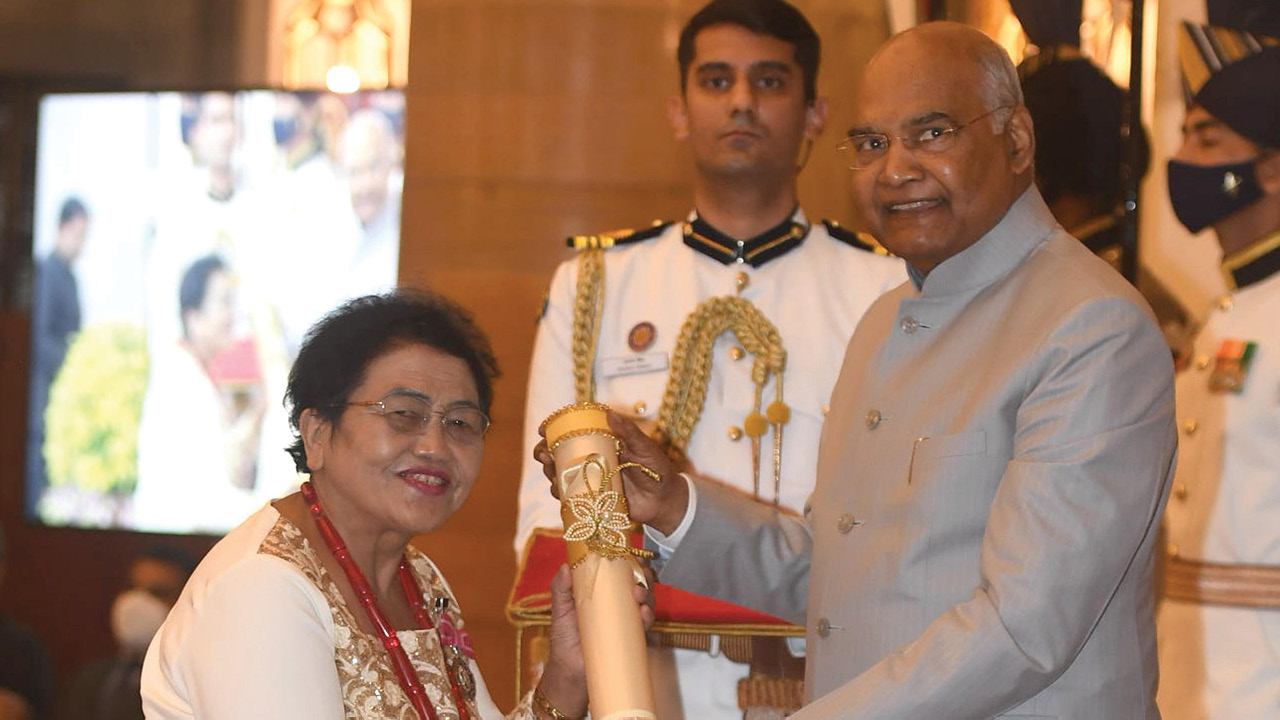Sangkhumi Bualchhuak
Sangkhumi Bualchhuak
Born: 1948
H.NO. Y II, A-7, Chaltlang Dingdi Veng
Aizawl, Mizoram – 796012
Padma Shri: 2021

About
Sangkhumi Bualchhuak, a distinguished social activist from Mizoram, India, has been pivotal in championing women’s rights and empowerment in the region. In recognition of her relentless dedication to social work and her transformative impact on Mizo society, she was honoured with the prestigious Padma Shri award in 2021.
Education
Born in 1948 in Mizoram, Sangkhumi faced personal adversities early in life, including losing her father during the Mizo National Front movement. Despite these challenges, she pursued higher education in Shillong, Meghalaya, benefiting from scholarships for her academic excellence. This educational foundation equipped her with the knowledge and resilience to address societal issues, particularly those affecting women.
Hardships Faced
Growing up during a tumultuous period in Mizoram’s history, Sangkhumi witnessed firsthand the atrocities and injustices inflicted upon women, especially during the insurgency years. The societal norms and archaic laws prevalent at the time marginalised women, denying them fundamental rights and subjecting them to systemic discrimination. These experiences galvanised her commitment to advocating for women’s rights and challenging patriarchal structures.
Contributions that Brought About the Change
Strategic initiatives and unwavering dedication mark Sangkhumi’s journey toward empowering Mizo women:
- Leadership in Mizo Hmeichhe Insuihkhawm Pawl (MHIP): Post-retirement, Sangkhumi led MHIP, the apex body representing numerous local women’s groups in Mizoram. Under her leadership, MHIP became instrumental in advocating for legislative reforms to protect and empower women.
- Advocacy for Legal Reforms: Recognising the detrimental impact of outdated customs on women’s rights, Sangkhumi and MHIP tirelessly campaigned for legal reforms. Their efforts culminated in the drafting and proposal of three significant bills in 2013:
- The Mizo Marriage Bill, 2013: Aimed to address inequities in marriage customs, including the contentious “bride price” practice, which commodified women and undermined their status in marital relationships.
- The Mizo Inheritance Bill, 2013: Sought to grant women rights over property, challenging traditional norms that excluded them from inheritance and left them vulnerable, especially after divorce or widowhood.
- The Mizo Divorce Bill, 2013, was intended to protect women from arbitrary divorces, ensure they receive fair treatment and support, and prevent destitution.
- Educational and Economic Empowerment: Beyond legal reforms, Sangkhumi emphasised the importance of education and economic independence for women. She promoted initiatives encouraging women’s participation in education and entrepreneurship, enabling them to become self-reliant and confident societal contributors.
- Translation of Legal Documents: To ensure that women were aware of their rights, Sangkhumi undertook the task of translating essential laws related to domestic violence, rape, and human rights into the Mizo language. This initiative made legal information accessible, empowering women to seek justice and assert their rights.
- Grassroots Mobilisation: Recognising the power of collective action, Birubala established the Thakurvila Mahila Samity, a women’s association dedicated to raising awareness about social maladies, including witch-hunting. This initiative empowered local women to challenge age-old superstitions and advocate for their rights.
Before and After
Before Sangkhumi’s interventions, Mizo society was characterised by patriarchal norms that severely limited women’s rights. Practices like the “bride price” reduced women’s status within marriages, and lack of property rights left them economically vulnerable. Divorce laws were skewed against women, often leaving them destitute without any support.
The concerted efforts led by Sangkhumi brought about a paradigm shift:
- Legal Recognition: The proposed bills, once enacted, abolished discriminatory practices and established equitable rights for women in marriage, divorce, and inheritance. For instance, the Mizo Marriage, Divorce, and Inheritance of Property Act, 2014, ensured that women could receive up to 50% of their property after divorce, a monumental change from previous customs.
- Empowerment and Awareness: With increased access to education and legal knowledge, women became more aware of their rights and were better equipped to challenge injustices. This empowerment led to greater participation of women in various sectors, contributing to the socioeconomic development of Mizoram.
- Cultural Shift: The reforms initiated a cultural transformation, challenging deep-seated patriarchal norms and fostering a more inclusive and equitable society.
Achievements and Accolades
Sangkhumi’s relentless pursuit of justice and equality has been widely recognised:
- Padma Shri Award (2021): One of India’s highest civilian honours, awarded for her significant contributions to social work and women’s empowerment.
- Leadership Roles: She served as the Director of Higher & Technical Education in the Government of Mizoram and later as a member and Chairman of the Mizoram Public Service Commission (MPSC), showcasing her commitment to public service and education.
- MHIP Day: Under her leadership, MHIP’s impact was so profound that July 6 is celebrated as MHIP Day in Mizoram, marking the organisation’s contributions to women’s rights and empowerment.
Sangkhumi Bualchhuak’s life and work exemplify the transformative power of dedicated activism. Her efforts have reformed laws and reshaped societal attitudes, paving the way for a more just and equitable Mizoram.

